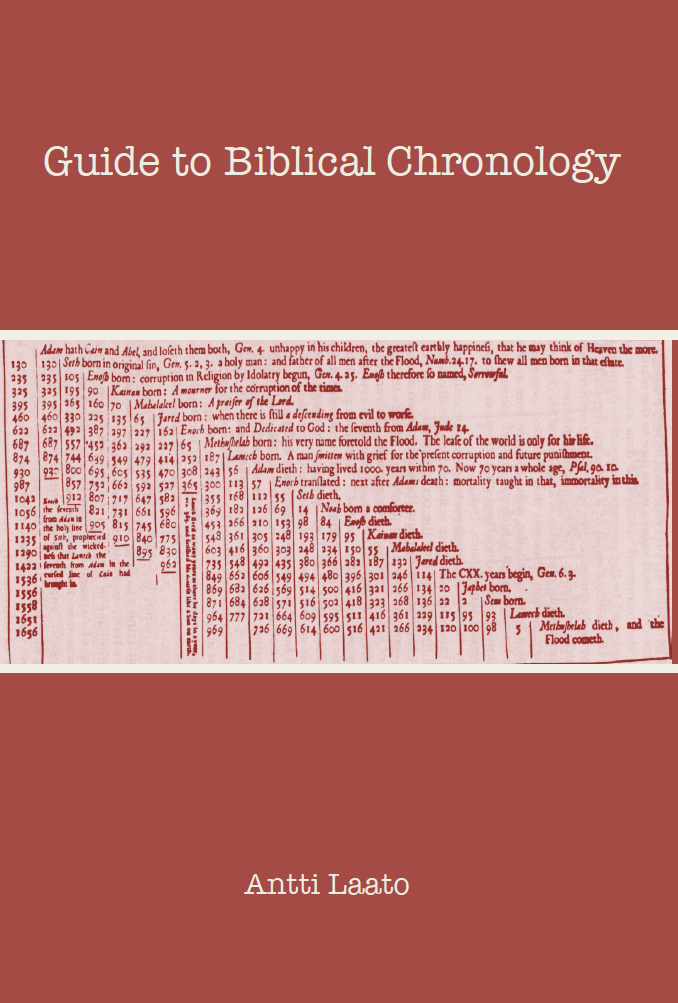Guide to Biblical Chronology
£18.50
This Guide to Biblical Chronology aims to explain why different chronological proposals exist for the reigns of kings of Israel and Judah and how the conflicting chronological data preserved in the Books of Kings have come into being.
This Guide to Biblical Chronology aims to explain why different chronological proposals exist for the reigns of kings of Israel and Judah and how the conflicting chronological data preserved in the Books of Kings have come into being.
The first step is to reconstruct older chronological data so that synchronisms are in harmony with each other. Only then can the chronological data be related to extrabiblical documents; such a comparison reveals a good degree of correspondence. This means that the chronological records of the kings of Judah and Israel during the period between 930 and 586 BCE must have based on reliable annalistic records from royal archives.
After the destruction of Samaria, synchronic chronological presentations of the history of Judah and Israel were composed and the Deuteronomistic editors used them. They drew their own conclusions from the source material and created a chronology of their own, which sometimes led to the contradictions we can detect in the present form of the Hebrew Bible.
Another important result is that the 480-year period mentioned in 1 Kings 6 and the 300-year period in Judges 11 are also based on the pre-Deuteronomistic chronological tradition even though they are not based on archival material and are therefore unreliable figures.
The Guide to Biblical Chronology also deals with postbiblical Jewish chronology, showing that there were in existence two different and competing chronological systems. One was based on Daniel 9.24-27 and followed by Josephus, and the other was first advanced by Demetrius the Chronographer in the late third century BCE and was then followed in the Damascus Document from Qumran and in Second Baruch .
Additional information
| table of contents | 1. INTRODUCTION Why This Book? The Methodological Procedure The Content of This Book Chronology for the Kings of Israel and Judah Albright’s Chronology Thiele’s Chronology Begrich’s and Jepsen’s Chronology Hayes’s and Hooker’s Chronology Hughes’s Chronology Galil’s Chronology Four Preliminary Questions The New Year Accession-Year or Non-Accession-Year System Co-regency as an Explanation Model Text-Critical Considerations Combined with Other Speculations 2. THE CHRONOLOGICAL DATA OF THE ISRAELITE AND JUDEAN KINGS Synchronisms and Royal Archives The Biblical Synchronisms of the Israelite and Judean Kings The Challenge of Extra-Biblical Documents to the Biblical Chronological System 3. RELIABILITY OF THE SYNCHRONIC TRADITION OF THE ISRAELITE AND JUDEAN KINGS Do We Have a Reliable Tradition for the Biblical Chronology on the Reigns of Kings? The Case of Uzziah 1 = Jeroboam II The Case of Omri’s Dynasty The Case of Pekah Summary 4. THE CHRONOLOGY OF THE LAST JUDEAN KINGS The Evidence of the Babylonian Chronicle The Double Dating in Ezekiel 1.1-3 and the Last Kings of Judah 5. THE ABSOLUTE BIBLICAL CHRONOLOGY OF THE BOOKS OF KINGS Constructed Chronology and its Historical Relevance The Invasion of Shishak The Battle of Qarqar The Tribute of Jehu The Tribute of Jehoash The Possible Tribute of Azariah/Uzziah The Tribute of Menahem The Contact of Ahaz to Tiglat-Pileser III The Dethronement of Pekah and the Accession of Hosea The Destruction of Samaria The Invasion of Sennacherib The Forced Labor Tribute of Manasseh to Esarhaddon The Death of Josiah The Battle of Carchemish The First Conquest of Jerusalem The Destruction of Jerusalem Conclusions: Literacy in Israel Seals in Archaeological Excavations Monumental Inscriptions Early Literary Texts Biblical Sources Abecedaries 6. THE POSTBIBLICAL CHRONOLOGY AND THE SEVENTY YEAR-WEEKS IN THE BOOK OF DANIEL Inaccurate Chronology in the Second Temple Period The Chronology of Josephus The Chronology of Demetrius The Chronology in the Damascus Document The Chronology in Second Baruch The Outcome of the Chronological System in Daniel 9.24-27 7. THE DEUTERONOMISTIC CHRONOLOGICAL FRAMEWORK FOR EARLY ISRAEL 8. THE PRIESTLY CHRONOLOGICAL FRAMEWORK FROM ANNO MUNDI TO THE PATRIARCHS 9. CONCLUSIONS |
|---|


Ernst Axel Knauf, Review of Biblical Literature. –
The slim volume is a competent introduction to the thorny field of biblical chronology and a welcome addition to the collection of basic tools for the student of Hebrew Scriptures. The introduction reviews previous chronologies from Albright (1945) to Galil (1996). Contradictions within the biblical data found creative responses within this scholarly tradition, some of which might look a bit too creative from the present point of view. The introduction concludes with the presentation of four problem areas that require decisions before a biblical chronology can be compiled: the date of the New Year in Israel and Judah; the question of the accession year; the question of co-regencies (never mentioned in the Bible with the exception of David and Solomon [1 Kgs 1:1–2:10] and Uzziah and Jotham [2 Kgs 15:5] but frequently assumed in previous chronologies); and the textual evidence, especially discrepancies between the Masoretic Text and the Septuagint.